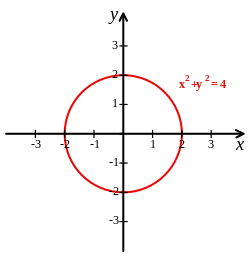Cartesian coordinate system - Simple English Wikipedia, the free encyclopedia

In mathematics and geometry, the Cartesian coordinate system is a coordinate system used to give the location of points on a plane by using two numbers for each point. It is also called the rectangular coordinate system. The numbers are usually called the coordinate and the coordinate or sometimes the abscissa and ordinate. To find the coordinates of a point, two perpendicular lines, called axes (singular: axis), are drawn. The point where the axes meet is the coordinate origin, written (0,0). The coordinate gives the position of a point measured along the axis, and the coordinate gives the position along the axis.
Cartesian coordinates can be used in three dimensions (3D), by adding a third number, the coordinate. In four dimensions (4D), a fourth number, the coordinate, is added. Each coordinate represents a dimension of space.
Using the Cartesian coordinate system, many shapes, like straight lines and parabolas can be described by using algebraic equations. The results of the equations can be seen by plotting (drawing) a point for each solution to the equations. For example, the axis is described by the equation . A circle having radius and centered at the origin can be described with the equation (see Figure 2).
The name Cartesian comes from the French mathematician and philosopher René Descartes (Latin: Cartesius), who worked to merge algebra and Euclidean geometry. This work was important in creating calculus and cartography.
The idea of this system was developed in 1637 in two works by Descartes. In part two of his Discourse on Method, Descartes explains plotting the position of a point or object on a surface, using two perpendicular axes as measuring guides. In La Géométrie (Geometry), he further explores these ideas.
Related pages
[change | change source]


 French
French Deutsch
Deutsch






